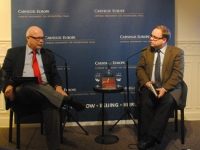Registration
Thank you!
You will receive an email confirming your registration.
IMGXYZ3358IMGZYXTo mark the European launch of his new book, Post-Imperium: A Eurasian Story, Dmitri Trenin discussed Russia's foreign policy and global influence with Carnegie Europe’s Jan Techau.
In his book, Trenin argues that Moscow, twenty years after the end of the Soviet Union, needs to drop the notion of creating an exclusive power center in the post-Soviet space. Like other former European empires, Russia has no choice but to reinvent itself as a global player and as part of a wider community.
Effects of a Smooth Transition
- End of Empire: The relatively smooth transition that followed the dissolution of the Soviet Union has led to its break up being taken for granted by both Russia and the world, Trenin explained. In fact, the empire’s collapse has had a profound impact on Russian mentality. Recognition of the former empire and its loss must be central to contemporary Russian analysis. Trenin added that Russia’s neighbors and the West must stop treating Russia as a former and future empire, asserting that the country is post-imperial, not neo-imperial.
- Transformation: Trenin argued that unlike the end of some European empires of the twentieth century, the transition in Russia saw little bloodshed and no occupation. Yet, Trenin said, the relative ease of its imperial break-up has led some to believe that the Soviet Union could have been saved. Meanwhile, a younger generation has grown up with the idea that an awe-inspiring empire has been withheld from them. Now that there is no longer a Russian empire, the key question is: what is Russia without it?
A State Without A Nation
- Individual vs. State: Today, Trenin argued, Russia is not a nation-state but a state of 140 million individuals. The state itself is essentially privatized, and those who work for it do so as much for their own benefit as they do for the administration. Trenin believes that this individualism is born from having been present at the ‘funeral of the state’ in 1991. Once the Russian people realized they could manage their private affairs without reliance on or sacrifice to the state, they began to dissociate themselves from it, attending first and foremost to individual needs.
- From Private Space to Public Square: Trenin acknowledged that the Moscow protests following the December 4th, 2011 elections were a surprise, but commented that something of their kind had been on the horizon for a while. After 1991, he said, people were happy to secure their private domain by sacrificing their public one to those in office. However, with the growth of stability in Russia, the level of tolerance for corrupt government has dropped. Trenin believes that the December 4th protests were the expression of this growing frustration. He observed that not only did people turn out to vote in the recent State Duma elections, they spoke up afterwards to demand that their votes were counted. This, Trenin commented, is something very new.
Future Russian Leadership
- Engagement or Repression: Trenin suggested that Putin has two possible responses to the protests: engagement or repression. In the past, Putin has never used mass repression, however he has also never engaged on someone else’s terms. Trenin predicted the response would be some combination of the two, but noted that one thing was certain: Putin will not be able to rule as he did before.
- Putin the Pragmatist: Above all, Putin is a pragmatist and a skillful politician who will adapt to the evolving climate in Russia, Trenin said. Medvedev’s role is less certain, as his previous appeal for the Russian youth is now in question. Trenin predicted that Putin would reapportion Duma positions, such as committee chairs, to satisfy other national parties and address some public demands. Beyond that, in the short term, he will likely present a friendlier government face and hope that the people will not have the stamina for protest during the harsh Russian winter.
- Scenarios of Change: Trenin suggested there are many scenarios for change in Russia, some for the better and some for the worse. Central to any development is the question of whether continued protests can remain peaceful. Trenin questioned whether all sides would recognize their responsibility to maintain peace in Russia. Some, he said, are suggesting that the best outcome would be to restrain Putin democratically, for example by electing him in a second election round. Potentially, the Duma could also change from its current perception as a place for private money-making to a space for active and equal dialogue, he added.
A New Russia
- The Beginning of the Beginning: Trenin asserted that Russia has changed; there can be no return to the pre-December 4th state. The array of flags displayed at the Moscow protests on December 10th – the biggest so far – demonstrates that parties who disagree on many issues are united in their demand for free and fair elections. Unlike the end of the Soviet Union, there is no clear divide between distinct ideologies. Now, Trenin observed, divisions are complex but there is no doubt that Russia has stirred and will not go back into its private shell.
- A Test for the Russian People: Trenin labeled the present situation a ‘new world’ and a once in a generation opportunity to build a nation. He called for both Russian leaders and people to recognize that they all have a share in Russia. He asserted that the country will never be communist again, nor will it become liberal; the key for all Russians is to ensure their country is not corrupt. Trenin concluded that in the past the Russian people have been able to topple their tsars and install corrupt regimes. Whether they will now be able to found a republic on the ruins of the empire is the real question.
